sprungmarken_marker_1325
 AIMat Summer School 2025 AIMat Summer School 2025 24.06.2025 The Summer School will be held on 8-12 September at KIT. It will cover multiple applications of machine learning in materials research, e.g. materials design and property prediction, ML-potentials for atomistic simulations, self-driving labs, and materials synthesis predictions.
The Summer School is funded by the Carl-Zeiss-Stiftung with additional financial support by the KIT centers MaTeLiS and KCIST. Website & Application |
 Pascal Friederich receives Manfred Fuchs Prize Pascal Friederich receives Manfred Fuchs Prize 15.04.2025 Professor Pascal Friederich has been awarded the Manfred Fuchs Prize for his work on the use of artificial intelligence in the development of new chemical materials. Friederich's promising approach is to combine existing knowledge and large amounts of data with machine learning and algorithms in order to not only develop suitable materials, but also to finely simulate their properties. This accelerates existing processes and has the potential to deliver solution-orientated chemical molecules and materials for new medicines or green technologies. The research prize is endowed to promote young scientists in Baden-Württemberg. Further Information (only German) |
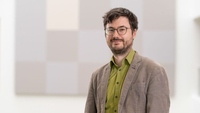 Gerhard Neumann receives ERC Consolidator Grant Gerhard Neumann receives ERC Consolidator Grant 04.12.2024 With the SMARTI³ project (Scalable Manipulation Learning through AR-Enhanced Teleoperation enabling Intuitive Interactive Instructions), Professor Neumann wants to improve the ability of robots to carry out complex tasks in real environments. He has been granted around 2.4 million euros for his research. With the ERC Consolidator Grants, the European Research Council (ERC) funds projects by outstanding scientists who completed their doctorate seven to twelve years ago and whose own independent research group is in the consolidation phase. Futher information |
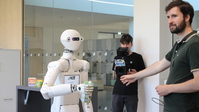 Real:labor Festival at KIT Real:labor Festival at KIT02.07.2024 What is real-world laboratory research, how can it change city life and how can you get involved? We will get to the bottom of these questions at the Real:lab Festival from 2 to 6 July 2024. The Real:lab Festival brings together numerous contributions from real-world lab researchers at KIT. KIT real-world laboratories with different focal points invite you to get to know each other and exchange ideas with other researchers and practitioners. InformatiKOM 1 opens its doors on Saturday, 6 July 2024. From 14:00 - 18:00, visitors can experience research on robotic artificial intelligence up close. Further information |
 Joining Forces In AI Research Joining Forces In AI Research02.07.2024 KIT has joined the Cyber Valley Innovation Campus, Europe's largest and leading center for artificial intelligence (AI) and modern robotics.
This was announced on June 21, 2024 at the opening of the ELLIS Institute in Tübingen, a Cyber Valley flagship project to strengthen the network between top AI researchers from all over Europe. To the press release (only German) |
 KIT partner at Robotics Institute Germany KIT partner at Robotics Institute Germany21.06.2024 The Robotics Institute Germany (RIG), jointly established by Germany’s leading robotics centers, is to become the central contact point for robotics in Germany. The goal of RIG is to strengthen Germany's global competitiveness and technological sovereignty in AI-based robotics. The initial conditions are favorable: Germany’s roboticists are among the global leaders in AI-based robotics and have made significant contributions to the international robotics landscape. "However, Germany has so far lacked a strategic approach that bundles the existing potential and utilizes synergies to secure Germany's long-term competitiveness and promote excellence and economic growth. We will establish the RIG as a nationally recognized and internationally unique institute that shapes cutting-edge research, education and innovation in AI-based robotics and aligns it with Germany's needs," explains RIG spokesperson Prof. Tamim Asfour from the Karlsruhe Institute of Technology (KIT). Further information |
 KCIST Colloquium: A Program of Research for Globally Optimal State Estimation in Robotics KCIST Colloquium: A Program of Research for Globally Optimal State Estimation in Robotics 04.06.2024 Dr. Frederike Dümbgen, INRIA and Ecole Normale Supérieure Paris, will give a talk about "A Program of Research for Globally-Optimal State Estimation in Robotics" on Thursday, June 06, 2024 at 09:30 in the Atrium of InformatiKOM I, Bldg. 50.19, Adenauerring 12. Further information |
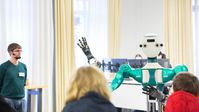 Bunte Nacht der Digitalisierung Bunte Nacht der Digitalisierung04.06.2024 The Chair of High-Performance Humanoid Technologies invites you to a lab tour as part of the Bunte Nacht der Digitalisierung on Friday, June 07, 2024 from 16:00 - 21:00 in in InformatiKOM, Building 50.19. This lab tour will provide an insight into how robots can support us in all areas of our everyday lives in the future. You will also have the opportunity to interact with one of the various humanoid robots yourself. |
 CZS Summer School 2024 CZS Summer School 202414.05.2024 The Summer School will be held on 9-13 September at KIT. It will cover multiple applications of machine learning in chemistry research, e.g. molecular design and understanding, ML-potentials for atomistic simulations, synthesis predictions, and self-driving labs. Website & Registration |
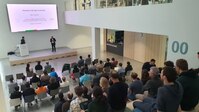 KCIST Colloquium: Planning in the Age of Learning - for Robotic Task and Motion Planning KCIST Colloquium: Planning in the Age of Learning - for Robotic Task and Motion Planning 28.03.2024 Marc Toussaint, Professor for Intelligent Systems at TU Berlin, gave a talk on "Planning in the Age of Learning -- for Robotic Task and Motion Planning" on Thursday, April 04, 2024 at 14:00 in the Atrium of Building 50.19. His research combines Planning, Optimization, Inference, and Machine Learning (ML) to tackle fundamental problems in Robotics and Physical Reasoning. Further information |
 BOGY Internships at H²T BOGY Internships at H²T06.02.2024 Once again there will be BOGY internships at H²T this year, for which we are excited to announce the date: |
 Call for application: Call for application:SICK Science Award 2022/2023 05.02.2024 In 2024, KCIST, in cooperation with the KIT-Stiftung, will again award two prizes funded by the Gisela and Erwin Sick Foundation to honor excellent scientific work in 2022 and 2023 in the research field of KCIST.
|
 KCIST Colloquium: KCIST Colloquium:Stable adaptation and learning 30.11.2023 Professor Jean-Jacques Slotine, Professor of Mechanical Engineering and Information Sciences, and Brain and Cognitive Sciences and Director of the Nonlinear Systems Laboratory at MIT, gave a talk on "Stable adaptation and learning" on Monday, Decembre 04, 2023 at 15:45 (Bldg. 50.20, Room 148). Research in Professor Slotine’s laboratory focuses on developing rigorous but practical tools for nonlinear systems analysis and control. These have included key advances and experimental demonstrations in the contexts of sliding control, adaptive nonlinear control, adaptive robotics, machine learning, and contraction analysis of nonlinear dynamical systems. Further information |
 Open House @ H²T Open House @ H²T14.11.2023 As part of the European Robotics Week 2023, H²T opened its doors to visitors on Friday, November 17, 2023, from 13:00 to 17:00. Our open house allows visitors to experience first hand the research of robotic AI through demonstrations of the humanoid ARMAR robots. With the help of artificial intelligence, the robots of the ARMAR family are able to learn from humans and interact with people in natural language. The lab tour provides an insight into how robots will be able to support us in the future in our everyday lives. There was also the opportunity for the visitors to interact with one of the humanoid ARMAR robots themselfes. Further information |
 KCIST Colloquium: KCIST Colloquium:Seminar on Software Technology Transfer 11.10.2023 The transfer of scientific knowledge out of research institutions into business and society is important to achieve real benefits and sustainable impact. The transfer of technologies creates innovation by developing new products, processes or services that improve people's lives or create new business opportunities. On Wednesday, October 18, 2023 at 14:30 the online-seminar on "Software Technology Transfer - Enter into Dialog with KIT Transfer Officers" by Dr. Dirk Feuchter, Licence Manager and Birgit Schulze, Innovation Manager took place. Key questions that were discussed: How relevant is the idea of transfer and exploitation in the design of a software project? What considerations help in the selection of a suitable license model? Which constraints should be considered during the development phase? Further information |
 Kathrin Gerling receives Starting Grant from the European Research Council (ERC) Kathrin Gerling receives Starting Grant from the European Research Council (ERC)11.09.2023 Kathrin Gerling, Professor of Human-Computer Interaction at the Institute of Anthropomatics and Robotics (IAR), aims to make virtual reality accessible to people with physical disabilities with her project "AccessVR". Virtual reality holds enormous potential for leisure, education and work. But currently most VR systems are designed for non-disabled people. Prof. Gerling's goal is to remove physical, digital and experiential barriers. The European Research Council supports outstanding young researchers with Starting Grants. Further information |
 Professor Spetzger receives Order of Merit of the State of Baden-Württemberg Professor Spetzger receives Order of Merit of the State of Baden-Württemberg10.07.2023 We are proud to announce, that our dear colleague, Honorary Professor Dr. med. Dr. h.c. Uwe Spetzger has been awarded with the Order of Merit of the State of Baden-Württemberg by Minister President Winfried Kretschmann for his efforts during the COVID pandemic. On this occasion Minister Kretschmann pointed out, that the core of Professor Spetzger’s tireless commitment in research and in everyday clinical practice is the humanitarian obligation of a medical doctor to place his life in the service of humanity. We congratulate Professor Spetzger for this great honor. Further information |
 Talk by Prof. Michael Grossniklaus: Talk by Prof. Michael Grossniklaus:"Advances in Cardinality Estimation for Database Systems " 22.06.2023 Professor Michael Grossniklaus from the University of Konstanz will give a talk about "Advances in Cardinality Estimation for Database Systems" on Wednesday, July 26, 2023 at 13:15 in Room -102, Bldg. 50.34. Michael Grossniklaus is a Full Professor at the Department of Computer and Information Science at the University of Konstanz since 2017. His research area is database and information systems, focusing on query optimization. Apart from relational database systems, Prof. Grossniklaus and his team are also interested in non-relational database systems, particularly graph database systems. Further information |
 KCIST Colloquium: Networks and Epidemics KCIST Colloquium: Networks and Epidemics22.06.2023 Clara Stegehuis, Associate Professor at the University of Twente will give a talk on "Networks and epidemics" on Monday, June 26, 2023 at 9:45 (Bldg. 50.31, Room 107). Further information |
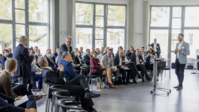 KCIST Colloquium: Data Analytics and Process Control in Semiconductor Manufacturing - When Big Data Gets Physical KCIST Colloquium: Data Analytics and Process Control in Semiconductor Manufacturing - When Big Data Gets Physical 02.06.2023 Dragan Djurdjanovic, Associate Director of the NSF Engineering Research Center on Nanomanufacturing Systems for Mobile Computing and Mobile Energy Technologies, at the University of Texas at Austin, gave a lecture on "Data Analytics and Process Control in Semiconductor Manufacturing - When Big Data Gets Physical" in building 50.36, room 010 (KIT) on Tuesday, June 06, 2023 at 16:00. Further information |
 KCIST Colloquium: Mastering New Visual Understanding Tasks in 3D Scenes with Efficient Learning KCIST Colloquium: Mastering New Visual Understanding Tasks in 3D Scenes with Efficient Learning 19.05.2023 Ziad Al-Halah, Assistant Professor of Computer Science in The University of Utah, gave a talk on "Mastering New Visual Understanding Tasks in 3D Scenes with Efficient Learning" on Tuesday, May 25, 2023 at 10:00 in bldg. 50.20 room 148. His work has been recognized with a best paper award (ICPR’14) and as the first place winner of the Habitat Challenge (PointNav) at CVPR'20 and the Textbook Question Answering Challenge (TQA) at CVPR'17. Further information |
 Dr. Noémie Jaquier is one of the AI Newcomers of the Year Dr. Noémie Jaquier is one of the AI Newcomers of the Year26.04.2023 Noémie Jaquier, PostDoc at the Institute of Anthropomatics and Robotics (IAR), is one of ten newcomers honoured by the Federal Ministry of Education and Research and the German Informatics Society (Gesellschaft für Informatik e.V.) at the international AI Camp 2023 on 26 April 2023 for their research work and extraordinary commitment in the field of artificial intelligence. Her research brings a new perspective to robot learning, optimisation and control by using Riemannian geometry as an inductive bias and developing data-efficient algorithms with solid theoretical guarantees. Further information (only German) |
 KCIST Colloquium: Future action models for AI-powered and cognitively-enabled robots KCIST Colloquium: Future action models for AI-powered and cognitively-enabled robots 19.05.2023 Michael Beetz, Professor for Computer Science at the University of Bremen and Director of the Institute for Artificial lntelligence, gave a talk on "Future action models for AI-powered and cognitively-enabled robots" on Tuesday, May 23, 2023 at 16:00 in bldg. 50.20 room 148. In the talk, he sketched ideas about a knowledge representation and reasoning (KR\&R) framework based on explicitly-represented and machine-interpretable inner-world models, that enable robots to contextualize underdetermined manipulation task requests on the first attempt. Further information |
 KCIST Colloquium: CANCELLED! KCIST Colloquium: CANCELLED! 07.06.2023 Due to unexpected circumstances, unfortunately we have to cancel the talk of Peter Corke, Distinguished Professor of Robotic Vision at Queensland University of Technology, Australia on Wednesday, June 14, 2023 at 11.30. Further information |
 Talk by Dr. Patrick Schäfer: Talk by Dr. Patrick Schäfer:"Unleashing the Potential of Unsupervised Time Series Analytics" 07.03.2023 Dr. Patrick Schäfer from Humboldt University (HU) Berlin gave a presentation about "Unleashing the Potential of Unsupervised Time Series Analytics: Recent Advances and Breakthroughs" on Friday, March 31, 2023 at 10:30 in Bldg. 50.34, room 301. Patrick Schäfer is a Postdoctoral Researcher and Lecturer of Computer Science at HU Berlin. His main research interests include scalable TS analytics, including supervised tasks, such as classification, and unsupervised tasks, such as motif discovery and segmentation. Further information |
 Fellowship awarded to Anne Koziolek and Steffen Becker Fellowship awarded to Anne Koziolek and Steffen Becker09.02.2023 Prof. Dr.-Ing. Anne Koziolek (KIT - KASTEL) and Prof. Dr.-Ing. Steffen Becker (University Stuttgart) received the teaching fellowship for “Lehrinnovationen und Unterstützungsangebote in der digitalen Hochschullehre Baden-Württemberg”. The Fellowship is funded by the Ministry of Science, Research and the Arts Baden-Württemberg and the Stifterverband. Professor Koziolek and Professor Becker received the funding for their collaboration in the project "Transfer of an innovative programming education with Mini Programming Worlds (TiPMin)". Further information (only German) |
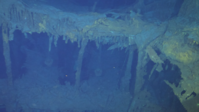 Invitation: Lecture on Expedition to Wrack of Titanic, Feb. 06, 2023 Invitation: Lecture on Expedition to Wrack of Titanic, Feb. 06, 2023Im Juli 2022 testete ein internationales Team des KIT und der Carnegie Mellon University während einer U-Boot-Expedition zum Wrack der Titanic in rund 4.000 Metern Tiefe neuartige Videokonferenzsysteme. Der Vortrag beschreibt die Forschungsreise in Bildern (Vortrag auf Deutsch, automatisch und simultan in verschiedene Sprachen übersetzt): 06.02.2023, 19:00 Uhr, Johann-Gottfried-Tulla-Hörsaal des KIT. Further information |
 KCIST introduced itself: KCIST introduced itself: KIT at City Hall on January 30, 2023 11.11.2023 On January 30, 2023 the KCIST presented its research activities at Karlsruhe City Hall. The citizens expected exciting lectures by KIT scientists around the guiding theme "The Age of Data and Artificial Intelligence". The Lord Mayor of Karlsruhe, the President of KIT and the scientific spokesperson of KCIST cordially invited to the event. Further information |
 Talk by Prof. Marius Kloft: Talk by Prof. Marius Kloft: "Deep Anomaly Detection" 30.11.2022 Professor Marius Kloft from the University of Kaiserslautern gave a talk about "Deep Anomaly Detection" on Friday, December 9, 2022 at 10:30 at the Karlsruher Decision and Design Laboratory - KD2Lab, in Bldg. 01.85 (Zähringer-Haus). Marius Kloft has worked and researched at various institutions in Germany and the US and is a Professor of Machine Learning at TU Kaiserslautern since 2017. Further information |
 KCIST Colloquium: KCIST Colloquium: How to Build Developing Minds 21.11.2022 Yukie Nagai, Project Professor at the International Research Center for Neurointelligence of the University of Tokyo gave a talk on "How to Build Developing Minds" on Friday, December 09, 2022 at 11:00 in bldg. 50.20 room 148. Together with her group she has been investigating human minds by a computational approach. Further information |
 Talk by Prof. Arun Rajkumar: Talk by Prof. Arun Rajkumar: "Learning to Rank from Pairwise Comparisons" 29.11.2022 On Tuesday, December 13, 2022 at 11:30 in bldg. 50.34 room -101, Prof. Arun Rajkumar from IIT Madras gave a talk about the problem of learning to rank from a set of pairwise comparisons. Arun Rajkumar is currently an Assistant Professor at the Computer Science and Engineering department of IIT Madras and leads the Machine Learning Theory lab at IITM. Further information |
 KD2School presents: KD2School presents: KIT Adaptive Systems Talks 28.11.2022 On Thursday, December 15, 2022, at 16:30, the "KIT Adaptive Systems Talks" took place at TRIANGEL Open Space at Kronenplatz Karlsruhe. On this occasion, the DFG graduate school "KD2School" celebrated its first anniversary. Participation is free of charge; due to the limited number of seats, early registration is requested. Further information and registration |
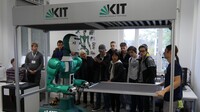 European Robotics Week European Robotics Week Open House at H²T 10.11.2022 As part of the European Robotics Week 2022, the Chair of High-Performance Humanoid Technologies (KIT, Adenauerring 2, Geb. 50.20, EG) opened its doors on November 25, 2022 from 13:00 - 17:00. Interested citizens were able to get an insight into the current research on intelligent, humanoid robots to support humans in everyday life and work. In addition to the laboratory tour, guests had the opportunity to get hands-on and interact with various humanoid robots. Further information |
 KIT Research Group SECUSO Receives Federal Consumer Protection Award KIT Research Group SECUSO Receives Federal Consumer Protection Award04.11.2022 The research group SECUSO (Security, Usability, and Society) of the KIT has been awarded with the Federal Consumer Protection Award by the German Consumer Protection Foundation (DSV). “IT security has to be comprehensible and feasible for everybody,” Professor Melanie Volkamer, Head of the SECUSO research group, explains their ambitions. “To achieve this, we offer free and clear information material on how to protect against fraudulent messages and protect user accounts with secure passwords.” The foundation of the Federation of German Consumer Organisations hands out this award to exceptional consumer protection projects. On Monday, September 26, 2022 the award was presented by Federal Minister for Consumer Protection Steffi Lemke in Berlin. To the press release |
 Two Best Paper Awards at IROS 2022 for SpeedFolding-Paper Two Best Paper Awards at IROS 2022 for SpeedFolding-Paper26.10.2022 The paper “SpeedFolding: Learning Efficient Bimanual Folding of Garments” by the authors Yahav Avigal (UC Berkeley), Lars Berscheid, Tamim Asfour, Torsten Kroeger (KIT - IAR) and Ken Goldberg (UC Berkeley) was awarded with the Best Conference Award as well as the Best RoboCup Paper Award at the 2022 IEEE/RSJ International Conference on Intelligent Robots and Systems (IROS), Kyoto, Japan. |
 Robert Piloty Prize for Prof. Jürgen Becker Robert Piloty Prize for Prof. Jürgen Becker 06.10.2022 The TU Darmstadt usually awards the Robert Piloty Prize to renowned scientists every two years. Professor Jürgen Becker (ITIV) has been awarded the Robert Piloty Prize 2022 for his outstanding scientific achievements in the field of efficient design of dynamically reconfigurable embedded systems, especially in the area of safety-critical applications. The honour is awarded for outstanding achievements in computer science, electrical engineering and information technology as well as applied mathematics and is endowed with a total of 10,000 euros and a medal. Further information |
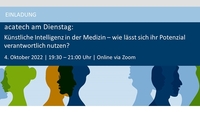 Acatech online event: Artificial intelligence in medicine - how can its potential be used responsibly? Acatech online event: Artificial intelligence in medicine - how can its potential be used responsibly?29.09.2022 On October 04, 2022 from 19:30 - 21:00, an online lecture entitled "Artificial intelligence in medicine - How can its potential be used responsibly?" with subsequent discussion will be held as part of the "acatech on Tuesday" event series in collaboration with vhs.wissen live. The speaker will be Prof. Dr. Peter Dabrock, Professor of Systematic Theology (Ethics) at Friedrich Alexander University Erlangen-Nuremberg. |
 New AI junior research group at SCC New AI junior research group at SCC22.09.2022 On September 1, 2022 the new junior research group "Robust and Efficient Artificial Intelligence" started at SCC under the leadership of Dr. Charlotte Debus. The group emerges from the BMBF project EQUIPE, which Dr. Debus successfully funded in a call for proposals for AI junior research groups within the framework of the BMBF guideline for the promotion of young researchers. The EQUIPE project aims to develop scalable and efficient methods for quantifying uncertainties in AI-based time series prediction and will fund the group leader and two additional PhD students over 3 years. To the press release |
 AI Engineering Workshop 2022 AI Engineering Workshop 202219.09.2022 All KIT researchers and interested parties are invited to participate in the workshop on "AI Engineering" organized by Professor Beigl (TECO) and his staff on September 23, 2022 at the Triangel Open Space. This workshop tries to bring together researchers from academia and industry to discuss the topic of Engineering AI and Engineering AI systems from many viewpoints and perspectives. The overall outcome of the workshop will be a short position paper summarizing different aspects and viewpoints of Engineering AI. Free of charge, registration is required. Further information and schedule |
 AI Hub@Karlsruhe // Networking Event AI Hub@Karlsruhe // Networking Event19.09.2022 From October 05 - 07, 2022 Cian Ates and Edouard Fouché are organizing the AI Hub @ Karlsruhe, an interdisciplinary networking event at KIT to bring researchers and practitioners with different backgrounds, at different career stages, and from different communities together to meet and exchange ideas about the recent developments and applications of AI. Participation is free, registration is required until September 30, 2022. To the AI Hub@Karlsruhe website |
 KIT receives Alexander von Humboldt Professorship KIT receives Alexander von Humboldt Professorship08.07.2022 Germany’s best-endowed research prize was awarded to computing expert André Platzer who is coming to KIT as a Humboldt Professor for artificial intelligence. His research is about making computer assistance systems for trains and aircrafts extremely safe. At KIT, Platzer will assume the Alexander von Humboldt Professorship for Logic of Autonomous Dynamical Systems and head the new Institute for Reliability of Autonomous Dynamical Systems, where he will seek synergies for the application of reliable CPS in other fields. To the press release |
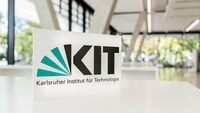 KIT at City Hall KIT at City Hall08.07.2022 On July 18, 2022, the KIT Center Humans and Technology presented its research at Karlsruhe City Hall. Under the title "Wandel gestalten", scientists presented current projects in science slams. In parallel, the MobiLab opened its doors in front of Karlsruhe City Hall on that day. Prof. Asfour and Prof. Hillerbrand answered the citizens questions at the MobiLab Science Bench on the topic of Artificial Intelligence and Robotics from 16:00 - 18:00. To the MobiLab Programm (PDF only German) |
 New KIT-Startup: Aimino New KIT-Startup: Aimino08.07.2022 Making AI systems more robust and secure with the help of artificial data - this is what the start-up Aimino Tech GmbH, founded in March 2021, is working on. Until now, a lack of data has limited system performance in many AI projects. As a result, they block the use of AI solutions in industry. Aimino's solution closes this data gap by producing synthetic, i.e. artificially generated, data that maximizes system performance. The goal is to increase the technical and economic added value of AI applications based on high data quality and quantity. To the Aimino website |
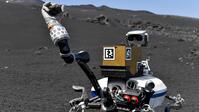 Exploring alien worlds with robot teams: demo mission on Mt. Etna Exploring alien worlds with robot teams: demo mission on Mt. Etna06.07.2022 To conclude the Helmholtz Future Project "ARCHES", the demo mission "Space" was conducted on the Sicilian volcano Etna from June 28, 2022 to July 1, 2022. The goal of the mission is to coordinate specialized robotic teams to explore inaccessible environments, such as other planets. In one part of the mission, an exploration of the moon was simulated, where, among other things, rock samples were successfully collected autonomously with the help of a humanoid hand developed by H²T. To the press release |
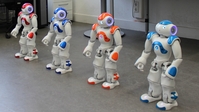 Science Camp Robotik Science Camp Robotik28.06.2022 Our next Science Camp will take place from 31 October to 4 November. In the camp, a group of school students will learn some basic, fundamental concepts of robotics and computer science and put them in practice, by programming the NAO humanoid robot. The Camp is a cooperation between KCIST, the KIT research group High Performance Humanoid Technologies (H²T), the ZML and the Schülerakademie Karlsruhe. Further information |
 Bunte Nacht der Digitalisierung Bunte Nacht der Digitalisierung20.06.2022 The Institute for Anthropomatics and Robotics opens its doors on 1 July from 15.00- 21.00 and gives an insight into its current research. |
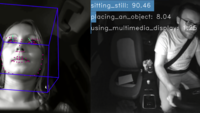 Helmholtz Doctoral Prize for Dr.-Ing. Alina Roitberg Helmholtz Doctoral Prize for Dr.-Ing. Alina Roitberg19.05.2022 Alina Roitberg, a PostDoc at the Institute of Anthropomatics and Robotics was awarded the Helmholtz Doctoral Prize for mission-oriented research in the field "Information" for her dissertation "Uncertainty-aware Models for Deep Learning-based Human Activity Recognition and Applications in Intelligent Vehicles". The Research Foundation rewards outstanding achievement and is intended to encourage future doctoral candidates to carry out mission oriented research and to position themselves at the interface between science and applications. More information about the Helmholtz Doctoral Prize |
 TIL: FESTIVAL at TRIANGEL Open Space from May 18 - 21, 2022 TIL: FESTIVAL at TRIANGEL Open Space from May 18 - 21, 202211.05.2022 During the Opening Week from May 18 - 21, 2022 of the TRIANGEL Open Space at Kronenplatz in Karlsruhe, TRIANGEL invites you to diverse lectures, impulses, discussions, art and culture under the motto #TIL. Free of charge, no registration required. TIL:FESTIVAL program (German only) |
 ERC Advanced Grant for KCIST-Member Professor Mehdi Tahoori ERC Advanced Grant for KCIST-Member Professor Mehdi Tahoori 28.04.2022 In its 2021 awarding round, the European Research Council (ERC) has decided to award an Advanced Grant to computer scientist Mehdi Tahoori, Professor for Dependable Nanocomputing at KIT. With his project PRICOM (stands for: Printed Computing) Professor Tahoori intends to enable dissemination of fast, inexpensive, and reliable (mini)computers on the consumer market and in personalized medicine. PRICOM focuses on the development of new computer architectures that are no longer based on conventional silicon chips, but on the principle of additive manufacture. To the press release |
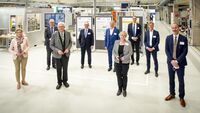 Karlsruhe Research Factory: Industrializing Production Processes Rapidly Karlsruhe Research Factory: Industrializing Production Processes Rapidly28.03.2022 Ceremonial opening of the development and demonstration center - Minister President Kretschmann: "Research factory will be important future laboratory for companies." To the press release (German only) |
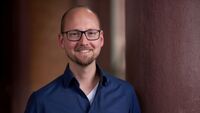 Heinz Maier-Leibnitz Prize goes to Pascal Friederich Heinz Maier-Leibnitz Prize goes to Pascal Friederich10.03.2022 Pascal Friederich, Tenure-track Professor at the Institute of Theoretical Informatics (ITI) and head of the research group AiMat (Artificial Intelligence for Materials Sciences), is awarded the Heinz Maier-Leibnitz Prize of the German Research Foundation (DFG). The prize in the amount of 20,000 € is the most important recognition of early-career researchers in Germany. Pascal Friederich’s interdisciplinary work concentrates on the use of artificial intelligence for the simulation of materials, virtual materials design, and autonomous experimental platforms for automatic materials recognition. To the press release |
 Call for application: SICK Science Award 2021 Call for application: SICK Science Award 202124.01.2022 In 2022, KCIST, in cooperation with the KIT Foundation (KIT-Stiftung), will again award two prizes supported by the Gisela and Erwin Sick Foundation to honor excellent scientific work in the previous year in the research field of KCIST. April 30, 2022. Further information on how to apply |
 New start-up at KIT: Daedalus New start-up at KIT: Daedalus07.02.2022 The German-American start-up Daedalus is pursuing the major goal of building the world's first autonomous and reconfigurable factories and is currently building its first autonomous factory for precision parts in Karlsruhe. Three of the company's four founders studied at KIT. The AI start-up develops innovative software and robot solutions that allow companies to build autonomous factories in which precision parts are manufactured without human input. Daedalus' software-controlled factories will make high-precision manufacturing scalable in the future, bringing the benefits of automation to customers of all sizes, regardless of quantities. To the Daedalus webpage |
 Community Dialogues: anchoring society in everyday scientific life Community Dialogues: anchoring society in everyday scientific life07.02.2022 Challenges such as the climate change or the corona pandemic are increasingly raising public awareness of science. But what expectations and wishes do citizens have of the work of researchers? The KIT is addressing this question and, starting in 2022, will regularly invite citizens to dialogs designed by researchers of the Institute for Technology Assessment and Systems Analysis (ITAS). To the press release |
 New start-up at KIT: SafeAD New start-up at KIT: SafeAD24.01.2022 Bringing autonomous driving safely to the masses: That is the goal of the start-up SafeAD, a spin-off from the FZI (Forschungszentrum Informatik), an innovation partner of KIT. The three founders, who all earned their doctorates at KIT, want to achieve this with a cardless approach. With the help of their technological knowledge from various fields such as machine learning, computer vision, computer graphics and sensor technology, autonomous driving without maps should reach the masses and change the mobility of the future in the long term. To the SafeAD website |
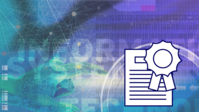 SICK Science Award 2020 SICK Science Award 202020.12.2021 On December 20, 2021, KCIST awarded the SICK Science Award in cooperation with the KIT Foundation. The prize is awarded for outstanding scientific achievements in the research fields of the KCIST. This year's awards go to the dissertation of Dr. Andreas Kuhnle and the bachelor theses of Peter Koepernik |
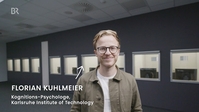 Appearance of the KD²Lab in an episode of "Beta Stories" of the BR Appearance of the KD²Lab in an episode of "Beta Stories" of the BR17.12.2021 The doctoral researcher Florian Kuhlmeier was interviewed for a segment in the docu-series Beta Stories by the tv channel BR titled "so realistic are relationships with robots" to talk about the research at KIT and especially of the KD²Lab (Karlsruhe Decision & Design Lab) with artificial intelligence-based chatbots designed to help teens get over depression. He and his team are working together on that subject in the "Stiftung der Deutschen Wirtschaft" project CAYD (A conversational agent for youths suffering from major depression). To the video |
 BOGY Internships at H²T in 2022 BOGY Internships at H²T in 202225.11.2021 In 2022, after the break due to corona , we will finally have BOGY internships at H²T again, for which we are very excited to announce the date: |
 The RealWorldLab as guest at the ZKM exhibition BioMedia The RealWorldLab as guest at the ZKM exhibition BioMedia16.12.2021 On Saturday, December 18, 2021, the exhibition "BioMedia - The Age of Media with Life-like Behavior" will open at the Center for Art and Media Karlsruhe (ZKM). Among the numerous exhibition objects is also the robot "Pepper", which was programmed in the context of the project "RealWorldLab - Robotics AI" for his appearance at the exibition by the research group led by Prof. Tamim Asfour at the Institute of Anthropomatics and Robotics, High Performance Humanoid Technologies (H²T) to welcome the guests, to give them information about the exhibition as a contact person and to invite them to socialize on the sofa. To the ZKM Exhibition |
 Interdisciplinary Lecture Series at IKB: Topology of Visualization Interdisciplinary Lecture Series at IKB: Topology of Visualization27.10.2021 In this lecture series, in order to determine and denominate different places of agency of visualization, guest from different discourses of knowledge are called upon discussing the idea of visualization which impacts most the character of theories and practices of making visible in their discipline Further information |
 ZAK Lecture Series: Data Literacy ZAK Lecture Series: Data Literacy27.10.2021 Data is the resource of the present. And this does not only apply to research. In the lecture series Data Literacy organized by the Centre for Cultural and General Studies (ZAK), KIT internal and external experts deal with the most important aspects of data analysis and use. The lecture series starts on Wednesday, October 27, 2021 and takes place on Wednesdays at 4 pm. Guest students are very welcome! Further information |
 Science Camp Robotik Science Camp Robotik15.10.2021 From November 2 - 5, 2021 our Science Camp Robotics will take place in person. In the camp, a group of school students will learn some basic, fundamental concepts of robotics and computer science and put them in practice, by programming the NAO humanoid robot. The Camp is a cooperation between KCIST, the KIT research group High Performance Humanoid Technologies (H²T), the ZML and the Schülerakademie Karlsruhe. Further information |
 Join us at Science Week in Karlsruhe! Join us at Science Week in Karlsruhe! 30.09.2021 Explore the simultaneous automatic translation system in action. Live at KIT's Triangel Open Space on Friday, October 8, 2021 from 10:00 - 15:00. No registration is needed - just stop by and have an insight into KIT's research. This event takes place within the first Science Week, taking place in Karlsruhe from October 5 - 10, 2021. To the Science Week website |
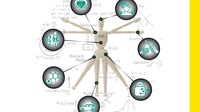 KIT Science Week 2021 KIT Science Week 2021 Scientific Conference and DGR Days: The Human in the Center of Learning Systems 08.09.2021 The KIT Science Week 2021 focuses on bringing the human back into the center of learning systems, by discussing the development of human-inspired, trustable, understandable, and adaptable AI technologies. The scientific conference took place from 6 - 8 October 2021. Download Program (PDF, ca. 2 MB) |
 New start-up company Camideos New start-up company Camideos11.08.2021 In times of climate change and energy transition, sustainable propulsion technologies for vehicles are becoming increasingly important. The four founders of the start-up Camideos, three of them KIT alumni, have developed software that determines energy and cost potentials for trucks. With the help of Big Data and AI methods, it calculates which consumption occurs in which driving situations. In addition, the spin-off from the Fraunhofer Institute for Systems and Innovation Research (ISI) is examining which sustainable drives can replace diesel fuel. To the Camideos website (German only) |
 Zoom takes over the spin-off company kites from KIT Zoom takes over the spin-off company kites from KIT30.06.2021 The US company Zoom Video Communications acquires kites GmbH, a KIT spin-off specializing in the development of real-time machine translation solutions. This was announced by Zoom on 29.06.2021. Zoom will also invest in further research at the Karlsruhe site. |
 New KIT Supercomputer "HoreKa" achieves international top rankings in energy efficiency and speed New KIT Supercomputer "HoreKa" achieves international top rankings in energy efficiency and speed30.06.2021 The new high-performance computer of the KIT is among the 15 fastest computers in Europe. The „Hochleistungsrechner Karlsruhe“ (short „HoreKa“) ranks 53rd on the biannual Top 500 list of the world's fastest computers. In terms of energy efficiency, it even makes the 13th place in the international supercomputer ranking. To the press release |
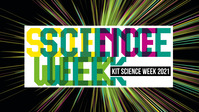 KIT Science Week: KIT Science Week:Karlsruhe all about KI 19.07.2021 KIT Science Week celebrates its premiere. For one week, from October 5th to 10th 2021, researchers from all over the world will dive into the world of artificial intelligence, AI for short, together with participants from politics and industry as well as citizens from the city and the region. The new KIT event format offers diverse approaches to AI and opens up spaces for discourse. KIT wants to take new impulses from the Science Week for its own research agenda as well. To the press release |
 Science Camp Robotik Online Science Camp Robotik Online 02.06.2021 From May 26th to June 1st our Science Camp Robotics took place again online. In the camp, a group of school students learnt some basic, fundamental concepts of robotics and computer science and put them in practice, by programming the NAO humanoid robot. The Camp is a cooperation between KCIST, the KIT research group High Performance Humanoid Technologies (H²T), the ZML and the Schülerakademie Karlsruhe. Further information |
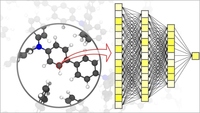 Machine Learning Accelerates Material Simulations Machine Learning Accelerates Material Simulations31.05.2021 Virtualizing the design process of new materials offers great prospects to accelerate technological innovation. The process of virtual materials screening and design depends on the availability of fast and accurate modelling techniques that reliably predict materials properties at realistic operating conditions. Professor Pascal Friederich, head of the research group AiMat – Artificial Intelligence for Materials Sciences at the Institute of Theoretical Informatics together with colleagues from Göttingen and Toronto do joint research on fast simulation methods. To the paper (nature materials) |
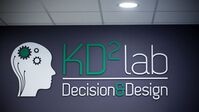 New Research Training Group (Graduiertenkolleg) GRK 2739 KD2School New Research Training Group (Graduiertenkolleg) GRK 2739 KD2School 12.05.2021 The German Research Foundation (DFG) supports the new Research Training Group (Graduiertenkolleg) GRK 2739 "KD2School - Design of adaptive systems for economic decisions". The spokesperson of the GRK 2739 is Professor Christof Weinhardt from the Institute for Information Systems and Marketing at KIT. To the press release (In German only) |
 ARMAR-6 at the Results Conference of the Hightech-Forum ARMAR-6 at the Results Conference of the Hightech-Forum 19.04.2021 together.grow.shape – under this motto, key players from research, economy and society from all over Germany will meet on April 21, 2021 for the virtual results conference of the high-tech forum. The high-tech forum is the federal government's central innovation policy advisory body for the implementation of the high-tech strategy 2025. The research on humanoid robotics and artificial intelligent of the High Performance Humanoid Technologies (H²T) group has also been selected for presentation in an online video. Don't miss it! To the video |
 KIT strengthens IT security research KIT strengthens IT security research24.02.2021 10 years in the service of cybersecurity: KASTEL continues its successful research in the new Institute for Information Security and Reliability of KIT. To the press release |
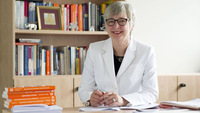 Dorothea Wagner elected Chairwoman of the Science Council Dorothea Wagner elected Chairwoman of the Science Council 25.01.2021 Computer scientist Dorothea Wagner, who researches and teaches at the Karlsruhe Institute of Technology (KIT), is the new chairwoman of the Science Council, the most important research policy advisory body in Germany. The professor and head of the KIT Institute for Theoretical Computer Science is the third woman in this position after her predecessor, the agricultural economist Martina Brockmeier, and the engineering scientist Dagmar Schipanski. See the KIT Press release (German only) To the Homepage of the Science Council |
 Professor Mehdi Tahoori elevated to IEEE Fellow Professor Mehdi Tahoori elevated to IEEE Fellow11.12.2020 The Institute of Electrical and Electronics Engineers (IEEE) honors the scientist for his research on integrated circuits at the nanoscale. Professor Mehdi Tahoori from the Institute of Computer Engineering (ITEC) of KIT was appointed Fellow by the International Engineering Association IEEE for his groundbreaking contributions in "contributions to resilient nanoscale integrated circuits" and thus awarded the highest membership status. To the Press Release |
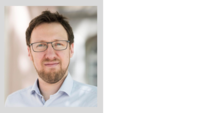 ERC Consolidator Grant for KCIST-Member Professor Laurent Schmalen ERC Consolidator Grant for KCIST-Member Professor Laurent Schmalen 09.12.2020 Excellent research on energy-efficient communication technology. KCIST-Member Professor Laurent Schmalen receives an ERC Consolidator Grant for his research. To the press release (German only) |
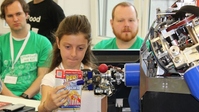 KIT will realize Real-world Lab "Robotic Artificial Intelligence" KIT will realize Real-world Lab "Robotic Artificial Intelligence"8.12.2020 With its real-world lab "Robotic Artificial Intelligence", KIT will make artificial intelligence tangible through bidirectional exchange between society and research. "The exchange of knowledge and experience goes in both directions in a real-world lab: Research and application come together at eye level, so that we can then develop precisely the technologies that people really need and want",says Tamim Asfour about the project. To the press release (German only) |
 KIT Becomes Center for National High Performance Computing KIT Becomes Center for National High Performance Computing 13.11.2020 Millions of Euros in funding for future supercomputers at KIT - Researchers all over Germany can use enormous computing power from Karlsruhe. Further Information (German only) |
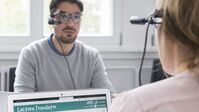 AI Outperforms Humans in Speech Recognition AI Outperforms Humans in Speech Recognition20.10.2020 The Interactive Systems Lab (ISL) at KIT developed the first speech recognition system worldwide that works better than humans and is quicker than other AIs To the press release |
 Staying young in elderly age with humanoid assistive robotics Staying young in elderly age with humanoid assistive robotics 15.10.2020 Goal of the JuBot project (German title: Jung bleiben im Alter mit humanoiden Assistenzrobotern) is the developement of a new generation of humanoid robots that are to assist elderly people in everyday life.
Link to the list of funded projects (German only) To the press release (German only) |
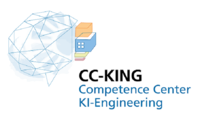 Making Artificial Intelligence manageable for engineers 29.09.2020 Goal of the newly started Karlsruhe Competence Center for KI Engineering (CC-KING) is the design and development of methods and tools that make the behavior of systems predictable and their decisions comprehensible. CC-KING is coordinated by the Fraunhofer Institute of Optronics, System Technologies and Image Exploitation IOSB with the participation of the Karlsruhe Institute for Technology and the FZI Research Center for Information Technology. To the press release (German only) |
 Science Camp Robotics Online Science Camp Robotics Online 12.09.2020 From Sept. 7th to 11th the first Science Camp Robotics took place (online because of the current restrictions). In the camp, a group of school students learnt some basic, fundamental concepts of robotics and computer science and put them in practice, by programming the NAO humanoid robot. The Camp is a cooperation between KCIST, the KIT research group High Performance Humanoid Technologies (H²T), the ZML and the Schülerakademie Karlsruhe. Further Information |
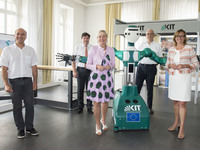 Minister Kristina Sinemus and State Secretary Katrin Schütz at H2T Minister Kristina Sinemus and State Secretary Katrin Schütz at H2T 10.08.2020
On August 10, 2020 the Hessian Minister for Digital Strategy and Development Prof. Dr. Kristina Sinemus and Katrin Schütz, State Secretary in the Ministry of Economics, Labour and Housing of the State of Baden-Württemberg, visited the Institute for Anthropomatics and Robotics. They gained insights into the current state of research in Artificial Intelligence using the examples of humanoid assistive and collaborative robotics, intuitive human-robot interaction, personalized hand prostheses and augmented exoskeletons. |
 Professor Peter Sanders receives ERC Advanced Grant Professor Peter Sanders receives ERC Advanced Grant March 31, 2020 Professor Peter Sanders, Institute of Theoretical Informatics, received an ERC Advanced Grant for the Project “ScAlBox - Engineering Scalable Algorithms for the Basic Toolbox”. Goal of the project is the design and development of algorithms and software libraries able to handle huge data sets and to scale to millions of processors working in parallel. Further Information (German only) |
 Professor Peter Sanders wins the "Test-of-Time"-Award 2019 of the European Symposium on Algorithms (ESA) Professor Peter Sanders wins the "Test-of-Time"-Award 2019 of the European Symposium on Algorithms (ESA) March 2020 Professor Peter Sanders (Institute of Theoretical Informatics) received together with Ulrich Meyer (University of Frankfurt) the ESA Test-of-Time Award 2019. ESA is the premier European conference on algorithms research. The ESA Test-of-Time Award recognizes excellent papers in algorithms research that were published in the ESA proceedings 19 to 21 years ago and are still influential and stimulating for the field today. |
| Professor York Sure-Vetter appointed Director of the National Research Data Infrastructure (NFDI) March 2, 2020 Main goal of the NFDI is to make existing scientific and research data available to the national and international scientific community in a structured, networked, well-organized and sustainable way. FIZ Karlsruhe and KIT are entrusted with the establishment of the Directorate of the National Research Data Infrastructure (Nationalen Forschungsdateninfrastruktur). Further Information (German only) |
| Professor Dorothea Wagner is the new Chairperson of the German Council of Science and Humanities January 31, 2020 On Friday, 31 January 2020, the German Council of Science and Humanities (Wissenschaftsrat) unanimously elected Professor Dorothea Wagner (Institute of Theoretical Informatics) as its new chairperson. |
| New Year's speech by Prime Minister Winfried Kretschmann January 1, 2020 In his New Year's speech, the Prime Minister of Baden-Württemberg talked about three impressive encounters in 2019, including one with Professor Tamim Asfour during his visit to the Institute for Anthropomatics and Robotics at KIT last November. Text and video of the speech (German only) |
| Professor Thomas Zwick joins acatech December 12, 2019 Professor Thomas Zwick, Institute of Radio Frequency Engineering and Electronics (IHE), has become a member of the National Academy of Science and Engineering. |
| Winfried Kretschmann and Robert Habeck at IAR-H²T November 22, 2019 On Friday, 22 November 2019, Baden-Württemberg's Minister President Winfried Kretschmann and the Federal Chairman of the Green Party Robert Habeck visited the Chair of High Performance Humananoid Technologies (H²T) of the Institute for Anthropomatics and Robotics (IAR). During the visit, they gained insight into the current state of research on the topics of humanoid assistance robotics in households, collaborative humanoid robotics for industrial applications and intelligent hand prostheses and exoskeletons. KIT press release (German only) |
| Professor Rüdiger Dillmann elevated to IROS Fellow November, 2019 Professor Rüdiger Dillmann was awarded "IROS Fellow" at the 2019 IEEE/RSJ International Conference on Intelligent Robots and Systems (IROS 2019) in Macao. |
| Open House Day at IAR 2019 November 20, 2019 The High Performance Humanoid Technologies Lab (H²T) at the Institute for Anthropomatics and Robotics (IAR) will once again open its doors and give an insight into its current research in humanoid robots technologies within the framework of the European Robotics Week 2019. Location: KIT, CS, Bldg. 50.20, Ground Floor Time: 1 pm - 5 pm Target audience: Anybody interested |
| KIT Team wins the NEO 2019 Innovation Prize October 23, 2019 A team of the Institute of Anthropomatics and Robotics at KIT received the NEO 2019 Innovation Prize for HoloMed, a system designed to support the surgeon in the operating room. Thanks to the deployment of AI methods and augmented reality, HoloMed significantly enhances the precision when performing brain punctures. The NEO Innovation Prize is awarded yearly by the TechnologieRegion Karlsruhe. Further Information (German only) |
| ICMI Sustained Accomplishment Award for Professor Alexander Waibel October 17, 2019 Professor Alexander Waibel (Interactive Systems Labs) recieved the ICMI Sustained Accomplishment Award at the 2019 International Conference on Multimodal Interaction in Suzhou (Shanghai) China the 15-17 October. The Sustained Accomplishment Award is awarded each year at ICMI to a senior scientist who has made innovative, long-lasting, and influential contributions to the field of multimodal/multimedia interaction. |
| ISRR 2019 October 6-10, 2019 The International Symposium on Robotics Research (ISRR) 2019 will be held in Hanoi, Vietnam. General Co-Chair is Professor Tamim Asfour (Institute of Anthropomatics and Robotics at KIT). ISRR is one of the pioneering symposia in robotics worlwide and it promotes the development and dissemination of groundbreaking research and technological innovation in robotics with emphasis on its potential role to benefit humans. ISRR 2019 website |
| Highest Award for Professor Dorothea Wagner August 13, 2019 Professor Dorothea Wagner (Institute of Theoretical Informatics) received the Konrad Zuse Medal of the German Society of Comuputer Science (German: Gesellschaft für Informatik e.V.) for her outstanding achievements in computer science. |
| Open House Day 2019 at KIT June 29, 2019 Last Saturday the KIT Open House Day took place at Campus East. The KCIST was represented with its own tent and gave insights into current research areas regarding wearable robotics and informed about courses of studies in computer science. |
| ROBDEKON Opening Ceremony June 25, 2019 The BMBF founded competence center ROBDEKON (German abbrev. for Roboter für die Dekontamination in menschenfeindlichen Umgebungen) was officially inaugurated . Further information about the opening ceremony (German only) |
| SICK Science Award 2019 June 19, 2019 On 19 June 2019, KCIST awarded the SICK Science Award in cooperation with the KIT Foundation (German: KIT-Stiftung) in the framework of the "50 Years Informatics" ceremony. |
| CYBATHLON Prosthesis Series & AsWeR 2019 May 16-18, 2019 Last week, from 17 - 18 May 2019, the CYBATHLON Powered ARM and LEG Prosthesis Series organized by the Chair of High Performance Humanoid Technologies (H2T) of the Institute of Anthropomatics and Robotics (IAR) at KIT in collaboration with ETH Zurich took place. Highlight Clip (YouTube) |
| AgiProbot: Artificial Intelligence for future agile manufacturing March, 2019 The AgiProbot project, founded by the Carls Zeiss Foundation, started on March 1, 2019. The goal of the project is the design of an agile production system that dynamically reacts to uncertain product specifications using artificial intelligence. The developed solutions will be tested in a demonstrator factory. The team, consisting of different KIT research groups, is coordinated by the KIT Institute of Production Science (wbk). Project homepage (German only) |
| AsWeR19 - Call for Papers opened The Call for Papers for the Symposium on Assistive and Wearable Robotic Technologies (AsWeR) is open. Extended abstracts can be submitted under the following link: https://easychair.org/cfp/AsWeR19 AsWeR19 takes place at the Trade Fair Centre in Karlsruhe and is co-located with the CYBATHLON Prosthesis Series 2019 and the REHAB19. AsWeR19 and the CYBATHLON Prosthesis Series 2019 are both organized by KIT in cooperation with the CYBATHLON team of the ETH Zürich. Further Information |
| Safer Internet Day 2019 Febraury 5, 2019 Under the motto "Together protecting the KIT IT Infrastructure ", the research group SECUSO (AIFB) together with SCC, KASTEL and ZML prepared new KIT specific, easy to understand information material on cyber security based on previous research results. The KIT Safer Internet Day 2019 team will present and distribute this material to the interested public on February 5, from 11 am to 3 pm, in the KIT cafeteria. Further information (German only) |
| Open Day at IAR 2018 November 21, 2018 This year, the Institute of Anthropomatics and Robotics (IAR) will once again open its doors and give an insight into its current research within the framework of the European Robotics Week 2018. Both labs involved, the High Performance and Humanoid Technologies Lab (H²T) and the Intelligent Process Automation and Robotics Lab (IPR), will offer guided laboratory tours and some other specials. |
| Helmholtz Information & Data Science School for Health October, 2018 The newly founded Helmholtz Information & Data Science School for Health (HIDSS4Health) has the goal to train young scientists to deal with the huge amount of data arising in health. This should result into innovative methods for diagnosis and therapy. HIDSS4Health is a joint doctoral program of KIT, DKFZ (German Cancer Research Center) and the University of Heidelberg. Coordinator at KIT is Professor Ralf Mikut (IAI). Further information (German only) |
| 10 Years GAMI and Opening of the Artificial Intelligent Innovation Factory 2018 marks the 10th anniversary of the Global Advanced Manufacturing Institute (GAMI), a platform established by Professor Gisela Lanza, wbk Institute of Production Science, to facilitate Sino-German research and innovation programs related to Smart Manufacturing. On the occasion of the celebration that takes place on November 8, 2018 in Suzhou, the Artificial Intelligence Innovation Factory will be officially opened. The new research facility focuses on the deployment of Artificial Intelligence technologies and cooperative robotics in smart manufactoring environments. |
| Robotics AI Symposium in Paris September 5, 2018 The French Académie des sciences and the German Akademie of Sciences Leopoldina jointly organize the Symposium "Data Science versus Motion Intelligence" to strengthen the cooperation between France and Germany in Robotics AI. The organizers are Jean-Paul Laumond, CNRS-LAAS, France and Tamim Asfour, KIT, Germany. Further information |
| New competence center "ROBDEKON" July 25, 2018 ROBDEKON (German: "Robotersysteme für menschenfeindliche Umgebungen"), which started last June, deals with the deployment of robotics systems in contaminated area. The project is supported by the Federal Ministry of Education and Research (BMBF) and is endowed with twelve million euros for four years. KIT press release (German only) |
| ARMAR-6 at CEBIT June 11-15, 2018 ARMAR-6, developed at the High Performance Humanoid Technologies Lab (H²T) within the EU H2020 SecondHands research project, is shown at CEBIT at KIT booth (G52 in hall 27). The robot demonstrates its capabilities to intelligently and proactively assist a human coworker in the context of an industrial maintenance task. Further information |
| Artificial Intelligence, humanoid Robots and Deep Learning July 20, 2018 The magazine "Spektrum der Wissenschaft" organizes a seminar on the topic artificial intelligence, with particular focus on humanoid robotics and deep learning in computer vision. The speakers are Professor Rainer Stiefelhagen (cv:hci) and Professor Tamim Asfour (H²T). A tour through the labs of the H²T-IAR research group will close the program. Further information (German only) |
| Professor Michael Beigl in the "Tagesschau" April 23, 2018 Professor Michael Beigl (Chair for Pervasive Computing Systems) gave an interview in the Tagesschau (German national television news service) about the meaning of the Hannover Messe for the German economy. Further, he spoke about Germany’s current role and position in an international comparison in the areas of digitalization, Industry 4.0 and artificial intelligence. Interview (Tagesschau Website)
|
| The KUKA Udacity Robot Learning Lab at KIT March, 2018 The new KUKA Udacity Robot Learning Lab will be established at the Institute for Anthropomatics and Robotics - Intelligent Process Automation and Robotics Lab (IAR-IPR). The Lab, unique of its kind, will enable students worldwide to interact with real industrial robots through a remote interface and validate self-developed solutions directly on the robot. |
| Honorary Colloquium for Professor Hartmut Schmeck The 34th AIK-Symposiums "Good Algorithms" was held on Friday, February 16, 2018, in the Tulla Hall at KIT. On this occasion, the former KCIST scientific spokesperson, Professor Hartmut Schmeck (AIFB), celebrated his farewell from teaching at KIT. Further information (German only) |
| Professor Thomas Zwick elevated to IEEE Fellow Professor Thomas Zwick (IHE) has been elevated by the Institute of Electrical and Electronics Engineers (IEEE) to IEEE Fellow, effective January 1, 2018, for his "contributions to millimeter wave transceivers". IEEE Fellow is a distinction reserved for select IEEE members whose extraordinary accomplishments in any of the IEEE fields of interest are deemed fitting of this prestigious grade elevation. Further information (German only) |
| Publication in Science Robotics The taxonomy of whole-body support poses developed at the High Performance Humanoid Technologies Lab (H²T) at the Institute for Anthropomatics and Robotics (IAR) has been presented in the article "A whole-body support pose taxonomy for multi-contact humanoid robot motions" published in Science Robotics (20 Dec. 2017). |
| ARMAR-6 in the media The first press release featuring the humanoid robot ARMAR-6 was launched. The robot was developed at the High Performance Humanoid Technologies Lab (H²T) within the EU H2020 SecondHands research project. |
| BOGY positions KIT offers this year several opportunities to pupils, who would like to carry out their BOGY (German: Berufs- und Studienorientierung am Gymnasium in Baden-Württemberg) internship in the field of information technologies. Here some Links with further information: |
| European Robotics Week: Open day at IAR-H2T and IAR-IPR Within the framework of the European Robotics Week 2017, the Intelligent Process Automation and Robotics Lab and the High Performance Humanoid Technologies Lab at the Institute for Anthropomatics and Robotics open their doors to the public, respectively on November 21 and November 22, 2017. Registration is not required. |
| Honorary Colloquium for Professor Heinz Wörn A colloquium in honor of Professor Heinz Wörn took place on October 20, 2017 in the Garden Hall of the Karlsruhe Palace, on the occasion of his retirement. High-ranking guests from academia and industry attended the colloquium, which offered a lively overview of Professor Wörn's successful career. |
| Robotics meets children at KIT About 400 children attended the lecture “Mensch oder Maschine? Die Menschmaschine”, held by Professor Tamim Asfour on August 1, 2017 at the “KIT-Kinder-Uni 2017”. The young public listened with great interest to the latest developments in the field of humanoid robotics and participated actively to the lecture by answering questions and expressing opinions. Demos with the NAO humanoid robot and other toy robots rounded the lecture and were a true highlight for all children. The lecture is available online here. |
| Successful Open Day 2017 at KIT The KIT Open Day 2017 at Campus North, on June 24, was a great success. KCIST contributed to the event, by entertaining the visitors with a varied program, ranging from humanoid robots, mini radars and a system for the automatic translation of lectures at KIT.
|
| Professor Alex Waibel elected member of "Leopoldina" On March 15, 2017 Professor Alex Waibel (Interactive Systems Labs) was elected to the Leopoldina, one of the oldest academies of science in the world. It is dedicated to the advancement of science for the benefit of humankind and to the goal of shaping a better future. The Leopoldina brings together outstanding scientists from Germany, Austria, Switzerland and many other countries. Further information (German only) |
| Dr. Santiago Pagani awarded the ACM “Paul Caspi Memorial Dissertation Award” Dr. Santiago Pagani from the Chair for Embedded Systems has been awarded the ACM “Paul Caspi Memorial Dissertation Award” from SIGBED (Special Interest Group Embedded Systems of ACM) for his PhD thesis entitled “Power, Energy, and Thermal Management for Clustered Manycores". Further information |
| CeBIT: Symposium "Robotics in the 21st Century" Robotics experts from leading universities in Germany will discuss at CeBIT in Hannover current trends, newest achievements and future opportunities of robotics in the 21st century with special focus on human-machine interaction. The symposium will take place on March 22, 2017 (Hall 6 Konferenzforum Future Talk and Convention Center hall A3). Further information (German only) |
| KIT Motion-Language Dataset released The High Performance Humanoid Technologies (H²T) group released the KIT Motion-Language Dataset, an open large-scale dataset for linking human whole-body motion with natural language. |
| KIT im Rathaus The KIT Center Information ▪ Systems ▪ Technologies (KCIST) presents itself to the Karlsruhe public on Wednesday, January 25th, 2017, 6:30 pm, in the Karlsruhe City Hall. KCIST researchers will give an overview of some innovative research activities at KIT in the area of "Big Data and artificial intelligence". KIT-Reihe im Rathaus traf auf enorme Resonanz (German only) Further information (German only) |
| Professor Uwe D. Hanebeck elevated to IEEE Fellow Professor Uwe D. Hanebeck (ISAS) has been elevated by the Institute of Electrical and Electronics Engineers (IEEE) to IEEE Fellow, effective January 1, 2017, for his "contributions to nonlinear estimation and control". IEEE Fellow is a distinction reserved for select IEEE members whose extraordinary accomplishments in any of the IEEE fields of interest are deemed fitting of this prestigious grade elevation. |
| Professor Dennis Hofheinz awarded the ERC Consolidator Grant Professor Dennis Hofheinz develops new systems, by combining established cryptography methods with new elements under the project “PREP-CRYPTO: Preparing Cryptography for Modern Applications”. The European Research Council (ERC) will fund this project with about EUR 2 million in the next five years. Further information |
| ARAMiS II: Multi-Core Processors for Mobility and Industry 4.0 The Kick-off meeting of the project ARAMiS II took place early December 2016 at KIT. The goal of ARAMiS II is to enhance safety, efficiency, and comfort by using multi-core technologies in vehicles, aircraft, and production facilities. The project is funded by BMBF with EUR 15 Million. Further information |
| Professor Jörn Müller-Quade joins Acatech Thanks to his outstanding achievements in the field of theoretical computer science and cybersecurity, Professor Jörn Müller-Quade, Institute of Theoretical Informatics, has become a member of the National Academy of Science and Engineering. Further information (German only) |
| Professor Dorothea Wagner joins Acatech Thanks to her outstanding achievements in the field of theoretical computer science, |
| Inauguration Colloquium for the Research Training Group “Energy Status Data“ The German National Science Foundation (DFG) has granted a research training program „Energy Status Data – Informatics Methods for its Collection, Analysis, and Exploitation“ at KIT, which has started on May 1st, 2016. The inauguration colloquim will take place on November 7th, 2016 at 4 pm in the Tulla lecture hall of KIT. Further information |
| Professor Hartmut Schmeck awarded the Heinrich-Hertz-Preis At the annual meeting of the KIT Energy Center, the EnBW Foundation awarded Professor Hartmut Schmeck the Heinrich Hertz Prize 2016 for his outstanding achievements in the field of Energy Informatics. In particular, the award recognizes Professor Schmeck's contributions to the development and deployment of innovative information and communication technologies in intelligent energy management systems. Further Information (German only) |
| The Challenge of Big Data in Science The 5th International LSDMA Symposium on “The Challenge of Big Data in Science” will be held at the Karlsruhe Institute of Technology, Karlsruhe, Germany, on October 5th, 2016. The program includes presentations from several internationally renowned speakers. The full program as well as registration and travel information and can be found on the symposium homepage. |
| Definitive book of Machine Vision KCIST members Prof. J. Beyerer and Prof. F. Puente León published a standard work on Machine Vision. The book offers a thorough introduction to machine vision and covers systematically all relevant components of most automated visual inspection and image processing systems. Further Information |
| KIT starts new degree in Computer Science as part of the teacher training program Starting from the winter semester 2016/2017 the KIT Department of Informatics will offer a new degree program as part of its teacher training program (German Lehramtstudium). The new course of studies aims at training qualified teaching staff for computer science education in schools. Further Information (German only) |
| FUSION 2016 The 19th International Conference on Information Fusion will be held on July 5-8, 2016 in Heidelberg, Germany. General Co-Chairs are professor Uwe D. Hanebeck, KIT, and Dr. Wolfgang Koch, Fraunhofer FKIE. Further Information |
| DGR Days 2016 The DGR Days 2016, an event of the German Robotics Society (Deutsche Gesellschaft für Robotik, DGR), will be held on June 29-30 2016, in conjuction with RoboCup 2016, in Leipzig. The goal is to create a forum for academic exchange and foster a visible and interdisciplinary robotics community in Germany. A DGR Round Table will complement the program on June 30 - July 1, 2016. Further Information |
| DFG grants new Graduate School Energy provisioning systems have to cope with fluctuating supply and flexible demands. Goal of the new Graduate School “Energy Status Data - Informatics Methods for its Collection, Analysis and Exploitation” is the optimization of energy supply, through a structured collection, storage and analysis of large amounts of energy status data. Spokesperson is Professor Klemens Böhm, Institute for Program Structures and Data Organization (IPD). The Graduate School will start on May 1st, 2016. Further Information |
| 4th D-A-CH Energieinformatik Conference Germany, Austria, and Switzerland have set ambitious targets for increasing energy efficiency, reducing greenhouse gas emission and enlarging the share of renewable energy sources. Energy Informatics is developing the IT-based solutions required for achieving these targets. Fostering the transfer in this area between academia, industry and service providers was a major goal of the 4th D-A-CH Energieinformatik Conference, chaired by Professor Hartmut Schmeck (AIFB) and held in Karlsruhe on November 12-13, 2015. Further Information |
| DFG Grants SPP 1835 The SPP 1835 will design and implement methods for the cooperation among different interacting traffic participants, with the aim of enhancing the safety, reducing the environmental impact and the use of resources, improving the traffic flow as well as enabling a "life-long mobility for all". Coordinator of the SPP 1835 is Professor Christoph Stiller, Institut für Mess- und Regelungstechnik (MRT). Further Information (German only) |
| 31th AIK-Symposium Flexibility is a major requirements for future energy provisioning systems that will have to cope with both fluctuating demands and dithering supply. Experts from academia, in particular from KIT-AIFB and FZI, and industry discussed recent developments in the area at the 31th AIK-Symposium "Smart Energy" on October 23rd, 2015. Further Information (German only) |
| Maribel Acosta wins Best Student Paper Award at K-Cap 2015 October 11th 2015 - Maribel Acosta of the group Web Science and Knowledge Management (Prof. Studer / Prof. Sure-Vetter) won the Best Student Paper Award at the 8th International Conference on Knowledge Capture (K-Cap), Palisades, USA, 2015 with the paper "HARE: A Hybrid Engine to Query Answers via Crowdsourcing". |
| ISAS-ZAK cooperation awarded by "Germany - Land of ideas" Media art is often so space consuming that it can hardly be exhibited permanently. The cooperation between ISAS and ZAK „e-Installation – Virtual experience-room for media art" (German: "Virtueller Erlebnisraum für Medienkunst") aims at preserving works of media art for future generations by means of telepresence. The project was awarded on September 23, 2015 as "Distiguished location 2015" by the initiave "Germany - Land of ideas" . Further Information (German only) |
| Prof. Heinz Wörn awarded honorary doctorate degree Prof. Heinz Wörn, Institute for Anthropomatics and Robotics, received on March 18, 2015 from the Ufa State Aviation Technical University, Russia, the honorary doctorate degree, for his long-standing commitment to the German-Russian cooperation in the area of robotics and automation. |
| Successful grant application for InterACT The German Academic Exchange Service (DAAD) approved the proposal “Continuous Learning in International Collaborative Studies” (CLICS), which provides the International Center for Advanced Communication Technologies (InterACT) with a four years support. CLICS will develop three international Massive Open Online Courses (MOOC) in the areas of automatic speech recognition, machine translation and robotics. To facilitate international access to the MOOCs automatic transcription and translation technology will be used. |
| Prof. Dorothea Wagner in the German Council of Science and Humanities In January 2015 Federal President Joachim Gauck appointed Prof. Dorothea Wagner, Institute of Theoretical Informatics (ITI), to serve for three years in the German Council of Science and Humanities (Wissenschaftsrat). Further Information |
| 30 Years FZI On January 28-29, 2015 the FZI Research Center for Information Technology celebrated its 30th anniversary by organizing the congress “30 Years of Knowledge Transfer” with presentations on key topics like security, mobility, health care, industry 4.0, logistics, robotics, and energy. An Open House event rounded the program. |
| Prof. Jörg Henkel elevated to IEEE Fellow Prof. Jörg Henkel (Chair for Embedded Systems) has been elevated by the Institute of Electrical and Electronics Engineers (IEEE) to IEEE Fellow, effective January 1, 2015, for his "contributions to hardware/software codesign of embedded computing systems". IEEE Fellow is a distinction reserved for select IEEE members whose extraordinary accomplishments in any of the IEEE fields of interest are deemed fitting of this prestigious grade elevation. |
| Prof. Alexander Waibel elevated to IEEE Fellow Prof. Alexander Waibel (Institute for Anthropomatics and Robotics) has been elevated by the Institute of Electrical and Electronics Engineers (IEEE) to IEEE Fellow, effective January 1, 2015, for his "contributions to neural network based speech recognition and translation and multimodal interfaces". IEEE Fellow is a distinction reserved for select IEEE members whose extraordinary accomplishments in any of the IEEE fields of interest are deemed fitting of this prestigious grade elevation. |
| Prof. Alexander Waibel elevated to IEEE Fellow Prof. Alexander Waibel (Institute for Anthropomatics and Robotics) has been elevated by the Institute of Electrical and Electronics Engineers (IEEE) to IEEE Fellow, effective January 1, 2015, for his "contributions to neural network based speech recognition and translation and multimodal interfaces". IEEE Fellow is a distinction reserved for select IEEE members whose extraordinary accomplishments in any of the IEEE fields of interest are deemed fitting of this prestigious grade elevation. |
| Forum Bildverarbeitung 2014 On November 27-28, 2014, the Forum Bildverarbeitung 2014, an international forum on image processing, will take place in Regensburg. The event is organized for the third time by the Institute for Industrial Information Technology (IIIT) at KIT together with the VDI/VDE-Gesellschaft Mess- und Automatisierungstechnik and Fraunhofer IOSB. Homepage Forum Bildverarbeitung 2014 |
| KASTEL Team wins the 5th German IT-Security Prize A joint cooperation between KASTEL and the Wibu-Systems AG was awarded on October 23, 2014, with the first prize of the 5th German IT Security Prize of the Horst Görtz Foundation for their Blurry Box® method for software protection. Further Information (German only) |
| Team of Prof. T. Asfour wins the Best Poster Award at ICSR 2014 The results of a cooperation between the research group High Performance Humanoid Technologie (H²T) at KIT and the Takanishi Laboratory, Waseda University (Japan) were awarded with a best paper award on the "International Conference on Social Robotics": "A Novel Culture-Dependent Gesture Selection System for a Humanoid Performing Greeting Interaction", G. Trovato, M. Do, M. Kuramochi, M. Zecca, Ö. Terlemez, T. Asfour, A. Takanishi. |
| Professor Joachim Milberg visits the Institute for Anthropomatics and Robotics Professor Joachim Milberg, Chairman of the Supervisory Board of BMW AG, visited on October 22, 2014, the Institut for Anthropomatics and Robotics (IAR). Pictures |
| Team of Prof. R. Stiefelhagen wins the IBM Best Student Paper Award at ICPR 2014 The Paper Z. Al-Halah, L. Rybok, R. Stiefelhagen, "What to Transfer - High-Level Semantics in Transfer Metric Learning for Action Similiarity" won the IBM Best Student Paper Award in the category „Pattern Recognition and Machine Learning“ at the 22nd International Conference on Pattern Recognition (ICPR 2014). To the Press Release |
| Prof. Puente Editor-in-Chief of the journal "Technisches Messen" Since July 1, 2014 Prof. Puente serves together with Prof. Zagar (Uni Linz) as Editor-in-Chief of the renowned journal Technisches Messen (TM - Technical Measurement), a professional journal addressing the entire spectrum of application-based industrial measurement technology. |
